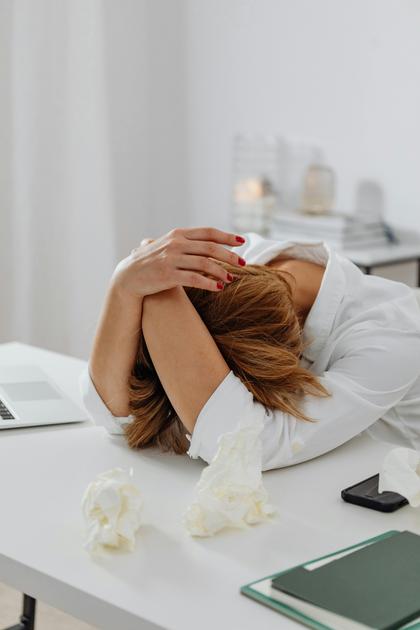Anxiety, Stress and Hair Thinning in Women: Break the Cycle!
Anxiety, stress, and hair thinning in women are more common than you might think. Are you feeling overwhelmed, battling fatigue, or noticing more strands in your brush? You’re not alone. Many women over 30 face these silent struggles daily, often feeling isolated in their experiences. Stress is a major trigger, and it can lead to hair thinning, which only adds to the anxiety. But what if we told you that it’s possible to break this cycle? It’s time to discover how empowering yourself with knowledge can help restore not just your hair, but also your peace of mind.
Understanding the Connection Between Anxiety and Hair Health
As women, we often carry the weight of various roles in our lives. Between work, home, and personal responsibilities, it’s no wonder that anxiety creeps in. This emotional turmoil has many effects, and one that often goes unnoticed until it’s too late is its impact on our hair health. When we experience high levels of anxiety, our body reacts in several ways, leading to conditions that may cause our hair to thin or even fall out.
The connection between anxiety and hair health primarily lies in the stress hormones our bodies produce during tough times. When you feel anxious, your body releases cortisol, a hormone that, in high amounts, is detrimental not just to your mental health but also to your physical health. Increased cortisol levels can disrupt the normal hair growth cycle, leading to shedding and thinning.
Why Stress Can Lead to Hair Thinning in Women
Stress doesn’t just impact how we feel; it also directly affects our bodies. When stress levels remain high over time, our bodies enter a state of chronic stress. This situation can trigger telogen effluvium, a condition where hair prematurely enters the shedding phase.
Here are some of the reasons why stress contributes to hair thinning:
- Restriction of blood flow: High stress can lead to smaller blood vessels, reducing blood flow to hair follicles.
- Reduced nutrient absorption: Stress disrupts digestion and nutrient absorption, essential for hair health.
- Hormonal imbalances: Stress can create hormonal fluctuations that impact hair growth cycles.
Understanding this cycle is crucial in identifying the root cause of hair thinning and preventing further damage.
Recognizing the Signs of Stress and Anxiety
Recognizing your body’s signals is vital in tackling anxiety and stress. Often, we can ignore our feelings or think they will pass with time, but being aware can help us take proactive steps. Here are some signs of stress and anxiety:
- Physical symptoms: Headaches, muscle tension, and gastrointestinal issues may all indicate stress.
- Emotional signs: Feeling overwhelmed, constant worrying, or irritability can be red flags.
- Behavioral changes: Changes in sleep patterns, loss of appetite, or social withdrawal are common reactions to stress.
If you notice any of these symptoms, it’s essential to address them promptly. Ignoring these signs may cause further emotional distress and health issues.
The Emotional Toll of Hair Loss in Women
Hair loss can be difficult for anyone, but for women, it often carries an additional emotional burden. Hair is often seen as a reflection of beauty and femininity. When hair begins to thin, the feelings may run deep, causing many women to feel inadequate or less attractive.
Many women grapple with feelings of shame or embarrassment about hair loss, which can lead to a cycle of anxiety and stress. The emotional impact is profound. Women may feel less confident during social interactions or withdraw from meaningful experiences, fearing judgment about their appearance.
Simple Strategies to Manage Anxiety and Stress
Managing anxiety and stress is vital not only for your mental well-being but also for your hair health. Here are some simple strategies you can incorporate into your daily life:
- Physical activity: Engaging in regular exercise can help reduce stress hormones while boosting endorphins.
- Deep breathing exercises: Simple deep breathing techniques can help calm the mind and body.
- Journaling: Writing about your feelings can provide an emotional release and help clear your mind.
- Hobbies: Engaging in activities you love can serve as a great distraction from stressors.
Implementing these simple strategies can greatly impact your overall well-being and hair health.
Nourishing Your Body for Healthier Hair
A balanced diet plays a crucial role in hair health. When you’re feeling stressed, it might be tempting to lean into unhealthy eating habits. However, nourishing your body with the right nutrients can strengthen your hair from the inside out. Consider including the following in your diet:
- Protein: Hair is made up mainly of protein. Ensure you consume adequate amounts through sources like lean meats, fish, beans, and nuts.
- Vitamins: Vitamins A, C, D, and E are important for hair health. Include spinach, sweet potatoes, and avocados in your meals.
- Minerals: Iron, zinc, and omega-3 fatty acids are essential. These can be found in foods such as lentils, seeds, and fatty fish.
By focusing on proper nutrition, you give your body the best chance to promote healthy hair growth.
Creating a Supportive Community for Women
Navigating stress and hair loss can feel isolating, but connecting with others who understand can provide comfort and encouragement. Find or create supportive communities, whether online or in-person, where you can share your experiences and feelings. Here are some ideas:
- Support groups: Join or start a group focused on women’s health issues, including anxiety and hair loss.
- Social media groups: Engage in online platforms where women share stories and tips on coping with similar challenges.
- Friends and family: Reach out to loved ones who can offer emotional support and understanding.
A supportive community can make a world of difference, allowing you to feel less alone in your journey.
Mindfulness Techniques to Reduce Stress
Mindfulness practices can significantly help reduce anxiety and stress. They encourage you to be present, fostering peace and tranquility in everyday life. Implementing simple mindfulness techniques can be a game-changer.
- Meditation: Set aside time each day to meditate. Start with just a few minutes and gradually increase.
- Yoga: Practice yoga to connect your body and mind, promoting relaxation and stress reduction.
- Mindful walking: Take a walk and focus on the sights and sounds around you, allowing your mind to relax.
Incorporating mindfulness into your routine can create a powerful shift in how you manage stress and anxiety.
The Role of Hormones in Hair Thinning
Understanding the role of hormones in hair health is crucial for many women. Conditions such as polycystic ovary syndrome (PCOS) or changes associated with menopause can wreak havoc on your hair.
Here are some key points to consider:
- Estrogen levels: Fluctuations can lead to hair thinning; managing these levels can improve hair health.
- Progesterone: A deficiency may lead to hair loss as it helps regulate hair growth cycles.
- Androgens: Elevated levels can contribute to hair thinning, particularly in cases of PCOS.
Awareness of hormonal impacts can empower you to seek the appropriate support and treatment when necessary.
Finding Hope: Steps to Regain Control and Confidence
While the cycle of anxiety, stress, and hair thinning might seem overwhelming, hope is always within reach. Taking small, actionable steps can lead to significant changes in your life. Remember, you are not alone; many women have experienced similar challenges and have found their way through.
The path to healthier hair and reduced anxiety can seem long, but every journey begins with a single step. Embrace the process, and be gentle with yourself as you work through these challenges. Believe that it is possible to improve your symptoms and regain confidence in yourself.
Every positive step you take, no matter how small, leads you closer to a healthier you. Discover the simple step-by-step method that has helped many women, just like you, take control. Remember, change takes time, but with persistent effort and the right tools, you can break the cycle and bloom once again.













